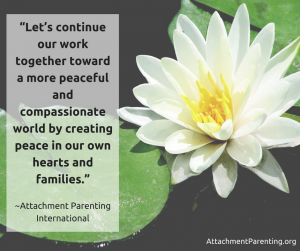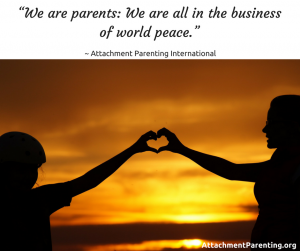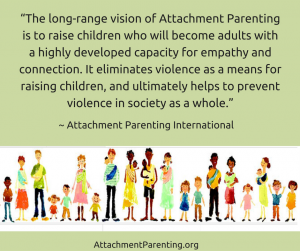Tag: peaceful parenting
Parents are all in the business of world peace
The long-range vision of Attachment Parenting
Speaking peace
Editor’s Note: This post was originally published on 2/9/2015. Written by Lysa Parker & Barbara Nicholson, API cofounders and coauthors of Attached at the Heart — this article captures the essence of Attachment Parenting, and this year’s AP Month 2016 theme, “Nurturing Peace: Parenting for World Harmony.”
We often reflect on whether or not API has made a difference in our efforts toward peace. API isn’t about promoting just parenting strategies: We have a broader long-term vision we have often described as “peaceful parenting for a peaceful world.”
We are living in a time in history that is both grave and great.
I heard a commentator say once that “stumbling into peace is better than rushing to war.” That is not a strategic plan for peace, and we know that governments and nations are less likely to make that a priority. It is the citizens, each and every one of us, who will create lasting change.
We know that, like punishment, war provides temporary results. So, as our world goes through its painful transformations, we continue to do the work of peace each and every day in our homes. We tend to want to have a quick fix, but the most lasting and effective peace will take generations.
Those of us involved with API do so because we want to be a part of something bigger than ourselves and to have an anchor in our own lives to help us transform, to undo our own negative internal programming, to learn to live — and speak — peacefully.
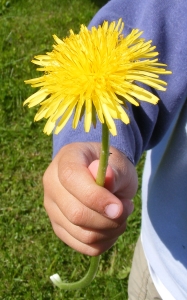 In a real sense, we are pioneers in creating a new paradigm in parenting and living.
In a real sense, we are pioneers in creating a new paradigm in parenting and living.
It isn’t easy, and as we learn, we will make mistakes. But from those mistakes come wisdom. We can’t let our mistakes immobilize us, but let us look at those times as opportunities to understand ourselves. Our support group community provides us with a net of safety to share, to be validated and supported.
API Support Groups are a foundational community for practicing peace, with our children and each other. These communities provide the opportunity to practice and engage in the language of peace: Nonviolent Communication (NVC).
This language style has and continues to teach me so much. I wish I had known about NVC when my children were small. Still NVC benefits me as an adult, both in talking to my grown children and other adults. NVC creator Marshall Rosenberg gave all of us a gift of skills that teaches us to:
- See the need behind the behavior
- Give us the vocabulary for our feelings and needs
- Teaches us to use “power with” rather than “power over” our children
- See each other’s humanness at the need level
- Move away from punishments
- Bring about peaceful change that begins with working on our own mindsets
Gordon Neufeld of the Neufeld Institute and Gabor Mate have also made major contributions to our understanding and skills to parent peacefully. They have taught us to look past our child’s behavior to find the unmet needs and strengthen parent-child connections.
That’s a radical departure from our culture where we feel we have to punish for every misdeed.
What we say and how we say it can make the difference between building relationships or breaking them down. We have to learn this new language of peace to accompany our actions toward peace, beginning in our own families. It is the essential component toward creating a peaceful world.
Nurturing peace, in our parenting and for our world
“Raising children with secure attachments and empathic hearts is essential to the future of mankind.” ~ GreatNonprofits
Is world peace possible?
When we talk about the potential for Attachment Parenting (AP) to change the world, we are referring to a ripple effect: Our children growing up to be compassionate and empathic, becoming parents who foster secure attachments with their children, whose children then grow up to repeat the cycle of peaceful living both in and out of the home.
Just as what our society experienced with La Leche League International’s breastfeeding revolution, begun more than 50 years ago, we at Attachment Parenting International (API) hope to be looking at a different kind of society in coming generations — one where disconnection is discouraged and healthy, securely attached relationships are valued above competition and shame.
API is working every day to better support and educate parents on establishing and maintaining secure parent-child attachments. And parents are striving every day to put API’s Eight Principles of Parenting to practice in their relationships with their children.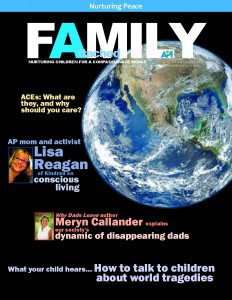
Many parents understand the challenge of adopting the new mindset needed to fully grasp how Attachment Parenting works. This parenting approach requires looking at the world, your child, your role as a parent and the way you live through a different lens — one that not everyone is able to see. API’s core ethos is a frame of mind that we promote as a practice: respect, empathy, compassion and reflection in thought, speech and action toward yourself and others.
We believe that parents who practice these habits of mind will tend to practice parenting in ways that resemble API’s Eight Principles of Parenting. Likewise, we believe that parents who practice the behaviors included in API’s Eight Principles of Parenting are capable and more likely to practice API’s ethos.
Once you “get” API’s ethos, Attachment Parenting can become much easier, much more “natural.” I liken it to stepping into an alternate reality of sorts. You’re able to view the world, your community, your home, your and others’ relationships in a whole new way and you can then make life choices from a point of compassion, trust, empathy and peace.
Our society tends to shy away from the concept of peace. To many, the idea of world peace is seen to be purely idealistic. We know it as the standard answer of pageant girls competing for Miss America. We also know that there are numerous ways touted to be the answer for world peace, from literacy to racial equality to democracy to certain religions. In reality, for world peace to be attainable, it must take a combination of factors from all levels of society. To many people, that may seem impossible.
Yet peace is what all of our souls crave. It is a sense of contentment, safety and security. It is a joy that doesn’t follow emotional highs and lows, that doesn’t fade when the excitement of instant gratification falls away. Peace allows us to feel centered and to find our balance quickly when we lose our equilibrium. Peace gives us a sense of purpose and control of our life’s direction. When living in peace, people have space in their lives to focus on bettering not only their lives but those around them.
But peace can be elusive. Many people simply do not know how to get to a place of peace in their lives.
For parents who come to API seeking support and education about Attachment Parenting, we offer a way. Secure attachment, promoted through API’s Eight Principles of Parenting, can help families find peace. A person whose attachment needs are met is able to think beyond the basic, day-to-day physical and mental survival and the “need” of trying to keep up with the hectic pace of society, in order to experience greater personal well-being and family enjoyment.
API is doing its part in promoting world peace. We truly believe in our mission to educate and support all parents in raising secure, joyful and empathic children in order to strengthen families and create a more compassionate world. And we truly believe in parents’ ability to do just that — to raise their children to be secure, full of joy, with the ability to empathize with and show compassion to others.
In the latest issue of The Attached Family, we explore “Nurturing Peace,” both in ourselves and our children, with features on:
 Conscious Living with Lisa Reagan, a member of API’s Resource Advisory Council, editor of Kindred and cofounder of Families for Conscious Living – through whom we learn about the inspiration for this issue’s cover, “the Blue Marble,” and how each of us are involved in public policy everyday of our lives just by living the choices we make…such how we choose to take parental leave after the birth of our baby
Conscious Living with Lisa Reagan, a member of API’s Resource Advisory Council, editor of Kindred and cofounder of Families for Conscious Living – through whom we learn about the inspiration for this issue’s cover, “the Blue Marble,” and how each of us are involved in public policy everyday of our lives just by living the choices we make…such how we choose to take parental leave after the birth of our baby How to talk to our children about world tragedies, why its important for our children’s development to protect them from adult concerns and what our children actually hear when parents mention starving children in Africa to try to convince their children to finish the food on their plates — by Tamara Brennan, executive director of the Sexto Sol Center
How to talk to our children about world tragedies, why its important for our children’s development to protect them from adult concerns and what our children actually hear when parents mention starving children in Africa to try to convince their children to finish the food on their plates — by Tamara Brennan, executive director of the Sexto Sol Center The Dynamic of Disappearing Dads with Meryn Callander, author of Why Dads Leave – through whom we learn the generational result of disconnected parenting of boys, and how wives and partners can better support new fathers in healing their emotional wounds to be able to bond with their baby and fulfill their role in the family.
The Dynamic of Disappearing Dads with Meryn Callander, author of Why Dads Leave – through whom we learn the generational result of disconnected parenting of boys, and how wives and partners can better support new fathers in healing their emotional wounds to be able to bond with their baby and fulfill their role in the family. ACEs with Jane Stevens, founder of ACES Too High and ACEs Connection Network – through whom we learn what ACEs are, how they are just as prevalent among families in poverty as well as middle class, and how resilience-building practices such as Attachment Parenting can both heal and protect people from the consequences of ACEs.
ACEs with Jane Stevens, founder of ACES Too High and ACEs Connection Network – through whom we learn what ACEs are, how they are just as prevalent among families in poverty as well as middle class, and how resilience-building practices such as Attachment Parenting can both heal and protect people from the consequences of ACEs.
We hope that this issue of The Attached Family will inspire your efforts to nurture peace within yourself, your family, your community and, yes, even the world.
Attachment, a Surprising Love Story
I called my friend, Javaughn in a panic on my way home from work (I started a part-time job as a teacher recently). “I have a post due for APtly Said tomorrow and I have not written anything. What should I write about?”
Then she began talking about her own experience with co-sleeping and how it has made a positive impact on her family’s nighttime parenting routine. Javaughn Renee’s beautiful essay (she is such a gifted writer and artist) illustrates that Attachment Parenting can be adapted to meet individual families’ needs. Take what you like and leave the rest. There is not a checklist, only a core belief that connection and love works to build stronger relationships with children and their parents.
Without further ado — here is Javaughn Renee. She has three beautiful adopted daughters and a multi-racial family.
***
I let off a ‘holier than thou,’ sigh when I got off the phone with a tired friend practicing Attachment Parenting principles.
“That’s crazy, “ I judged, and promptly placed my three year old in her crib and shut the door. Two years and two more adopted children later, I hear myself saying, “…hold on Meg, I have to put the girls to bed, I’ll call you back.”
This time, “put to bed,” means co-sleep. Co-sleeping became a solution to predictable, yet unpreventable, nighttime screaming matches. I got the idea not from a parent but from the last of a stream of behavior and adoption experts and my own desire to be a peaceful parent.
I never wanted screaming matches, sarcasm, or baths of tears to be part of my parental script. I wanted organic babies, who ate organic food and breastmilk, while I decorated their rooms with leaves, pinecones and non-violent paraphernalia. What I was blessed with, was three super strong-willed, attention-seeking, trauma survivors. These include a five-year-old who will eat a shoe if she believes it is made of sugar, a three-year-old who will sacrifice her body to concrete before she uses her words and a 15-year-old who will silently suffer an ingrown toenail for two weeks but cry buckets if she does not receive an Easter egg with the same amount of candy as her younger siblings.
And me? My locks evolved into a very chicken like hair-do, my natural deodorant left me smelling like an ape and instead of counting my (three) blessings, I fell asleep nightly wondering what did I do wrong. Then I heard about oxytocin, the miracle hormone for my badass kids. A hormone their pre-adoption circumstances deprived them of and a substance I was not nurturing. Though, I discovered, I could.
“When they [children with difficult behaviors] receive attuned and attentive care, children can begin to have a healthy oxytocin response and engage in healthy social and emotional relationships,” says author B. Byron Post.
The book applies what I recognized as (some) Attachment Parenting principles to adoptive parents who’ve turned into screaming zealots. Although, the book does not spell out API principles, Post’s (and others’) parental paradigm suggests that love, not fear will reduce stress and help children and parents regulate their emotions and behaviors.
So, “to hell with it,” I thought. “I’ll try this love, thing. ” Every other expert trick or response was out and sleeping with my kids was in.
It was weird. Then it worked. So far, we’ve generally had months of nighttime peace. Even nights of, even-though-we’re-mad-we’re-
I can’t lie to the readers of this site and have you all believe I never resort to consequences or power struggles– because it happens. Yet, API and other new parenting paradigms will remain a part of my skill set as a parent. All three of my children have to play catch up when it comes to love, nurture, and bonding, and Attachment Parenting will now play a part.
Javaughn Renee is a 43 year old writer and artist currently living in South Bend, Indiana but missing sunny California. She is a nature loving, yoga teaching, parent, striving to live simply and with love.
In 2010, she completed a Master’s Degree in Liberal Arts. Her research focuses on images of African Americans and nature and their effects on stereotypes. She has written for regional and national publications and blogs for other unique families at Mezclados.wordpress.com. Javaughn continues to write, practice yoga and parent while watching her daughters grow to be sensitive and strong.

